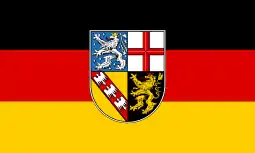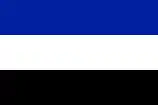Flag of Saarland
The flag of Saarland is based on the flag of Germany and is a black, red, and gold (yellow) horizontal tricolor. In the center of the flag is the coat of arms of Saarland. The flag of Saarland is both the civil flag (Landesflagge), as well as the state service flag (Landesdienstflagge).
 | |
| Name | Landesflagge des Saarlandes |
|---|---|
| Use | Civil and state flag |
| Proportion | 3:5 |
| Adopted | 1957 |
| Design | A horizontal tricolour of black, red, and gold, defaced by the Coat of arms of Saarland. |
 Variant flag of Saarland | |
| Name | Flag of the Territory of the Saar Basin |
| Proportion | 2:3 |
| Adopted | 1919–1935 |
| Design | A tricolour of blue, white, and black. |
.svg.png.webp) Variant flag of Saarland | |
| Name | Flag of the Saar Protectorate |
| Proportion | 2:3 |
| Adopted | 1945–1956 |
| Design | A white nordic cross, with the left side being blue and the right side being red. |
History
The Saar region was formed by the Treaty of Versailles which ended World War I. It was decided that the area belonged to Germany, but would be administered by France on behalf of the League of Nations. On 28 July 1920, it was decided that the area would use a blue, white, and black horizontal tricolour flag. This was used until 1 March 1935, when the area again came under German administration. In 1935, when Germany once again assumed control of the Saarland, it is assumed no new flag was created since the Saarland was absorbed into the area known as Westmark.
At the conclusion of World War II, the French assumed control of the Saar as a protectorate. The flag used at this time was a design with a Scandinavian cross. Left of the vertical bar of the cross was blue, and to the right was red. The colors are derived from the colors of the French flag.
When the Saar protectorate rejoined the Federal Republic of Germany, in 1957 it adopted its current flag. This is based on the flag of Germany, defaced by the Coat of arms of Saarland. The four quarters of the shield of the state coat of arms represent the historic areas of Nassau-Saarbrücken, Archbishopric and Electorate of Trier, Duchy of Lorraine, and Palatinate-Zweibrücken.[1]
